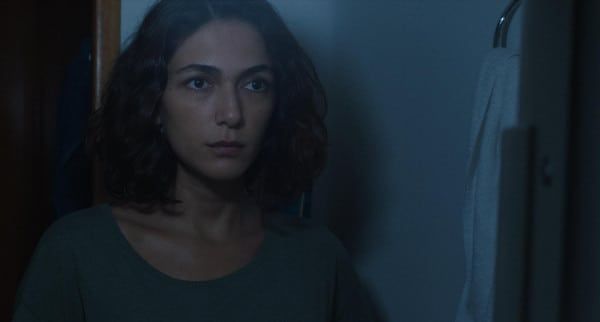Eye For Film >> Movies >> Lifeboat (2018) Film Review
Lifeboat
Reviewed by: Amber Wilkinson

Two's company and three's a crowd - and never more so than out on the open ocean. Not to mention that it's a risky strategy to give your film the same name as one by Alfred Hitchcock. Other directors have been here before, too, not least Roman Polanski with Knife In The Water, but the cutting edge of Josefine Kirkeskov's Lifeboat slices into one of Europe's hot-button issues - the refugee crisis.
Interestingly, for a film from any continent, the female half of the couple around which it revolves, Iben (Sofia Helin) is older than her lover Thomas (Pål Sverre Hagen) - a fact not so much worthy of note because of its impact on the plot but because it's such a rare event in modern cinema, more's the pity. The decision adds an extra layer of verisimilitude to the story, which sees the pair taking a yacht trip off the coast of Greece. Kirkeskov, writing with Nanna Westh, economically sets the loved-up scene between the two of them - "We'll f*** everywhere," one says as they tour the boat - but we also soon learn, via snippets of flashback that Iben is struggling to come to terms with loss.

This is what leads her to her insomnia and is why she is on deck to hear cries of help from the water at night. In a tensely dramatic scene - a sharp change of pace from what has gone before - they fish out a woman, Amal (Sebnem Hassanisoughi). The boat then becomes both the setting for psychological drama and a scrutiny of Europe's perceptions of refugees. Iben falls to assumptions about Amal, based partially on existing prejudice and partly on wish fulfilment that this new arrival will be a mirror to her own pain. As Iben's fragility grows, it seems that Amal might well be the stronger of the two women mentally and Kirkeskov keeps Amal's character ambiguous from the viewer's perspective, so that tension stems from what we don't know about her.
The sound design from Sophia Maj uses the splash of waves against the hull to subliminally reinforce the sense of the trio being cut off from the rest of humanity, while the almost constant creak of the boat, adds to the sense of threat in scenes when someone might be creeping about and, taken on a less literal level, mimics the strain that Iben's mental state is under. The first-time filmmaker has a few issues with pacing, as the sustained early tension gives way a little too readily to a flurry of action and event in the latter stages of the film, but she retains a sense of psychological uncertainty, so that we are left to draw our own conclusions about who of the three is more adrift at the end.
Reviewed on: 30 Nov 2018















